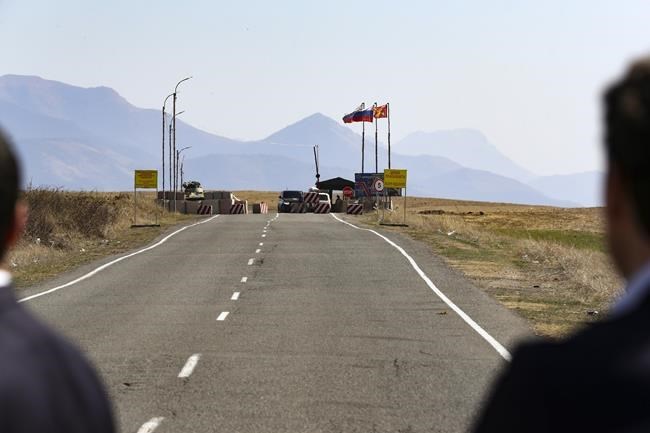
Azerbaijan's foreign ministry argues Foreign Affairs Minister Mélanie Joly is undermining peace in the Nagorno-Karabakh region by referring to the area as Artsakh, the name for the region used by Armenian secessionists. A checkpoint of the Russia peacekeeping force is seen on a road in Armenia leading towards the separatist region of Nagorno-Karabakh, Tuesday, March 14, 2023. THE CANADIAN PRESS/AP-PHOTOLURE, Vahram Baghdasaryan
Republished August 24, 2023 - 2:42 PM
Original Publication Date August 24, 2023 - 12:01 PM
OTTAWA - Azerbaijan's foreign ministry argues Canada's Foreign Affairs Minister Mélanie Joly is undermining peace in the Nagorno-Karabakh region by referring to the area with the name used by Armenian secessionists.
Nagorno-Karabakh is internationally recognized as part of Azerbaijan, but it is mostly populated by Armenians and neighbouring Armenia has fought for control of the region for decades.
Tensions rose in the area last fall when the region's main access road was blocked, leading to shortages of food and medicine that groups such as Human Rights Watch blame on Azerbaijan.
Canada is planning to send two officials to support a European monitoring mission that is aiming to prevent another war in the region.
Last Saturday, during a speech at the Armenian Community Centre of Montreal, Joly referred to the region as Artsakh, a term used by ethnic Armenians who want the area to secede from Azerbaijan.
In part of the speech posted on social media, Joly is seen saying that she plans to raise the Nagorno-Karabakh situation in upcoming summits held by the G20, G7 and United Nations.
"The region, and particularly Armenians, are facing a real threat in Artsakh," Joly said. "We need to bring this issue of Artsakh at every single diplomatic table we have access to."
In a Wednesday statement, Azerbaijan's foreign ministry argues Joly is making "one-sided statements" that support "separatism and revanchist forces" in the country.
"Such statements (by) Canada do nothing to serve the peace and stability in the region, and are unacceptable," ministry spokesman Aykhan Hajizada wrote in a press release.
"We once again demand from Canada to refrain from such provocative steps and to respect the sovereignty and territorial integrity of Azerbaijan."
Earlier this month, Conservative Sen. Leo Housakos referred to the Republic of Artsakh in an open letter congratulating a politician for his election as speaker to the breakaway region's national assembly.
A search of United Nations agencies and debates at its General Assembly suggests “Artsakh” is not used by countries other than Armenia to refer to the region. A search of federal websites suggests Canada has never used the term in official documents, other than when quoting the names or titles used by external groups.
Online critics of Joly compared using the term Artsakh to referring to parts of Ukraine that have been annexed by Russia by Moscow's nomenclature, such as the Donetsk People's Republic, a term only Syria and North Korea have joined in using.
But the head of the Armenian National Committee of Canada said Joly was using a word that Armenians have used to describe their home for generations.
"I think the minister did send a strong message by using that term," Sevag Belian said.
"It was a tactical move by the minister to send that message, to say that this is a region (with) Armenians living in it, and they cannot just simply be ignored, they cannot be left to starvation."
Meanwhile, a worsening humanitarian situation in the Nagorno-Karabakh region is drawing increased international attention.
Canada's ambassador to the United Nations, Bob Rae, wrote on Twitter this week that a humanitarian corridor must be enacted to stop an "unconscionable" blockade.
Housakos compared Azerbaijan's blockade to the Holodomor, the starvation of Ukrainians starting in 1932 which Canada has formally recognized as an act of genocide by the Soviet Union.
Earlier this month, the former chief prosecutor of the International Criminal Court, Luis Moreno Ocampo, warned that Azerbaijan is preparing for genocide in Nagorno-Karabakh, citing a UN definition that includes "deliberately inflicting on the group conditions of life calculated to bring about its physical destruction."
This report by The Canadian Press was first published Aug. 24, 2023.
News from © The Canadian Press, 2023